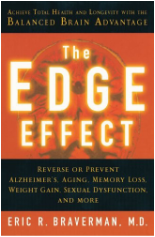 Dale Bredesen
Dale Bredesen What constitutes crazy talk with respect to Alzheimer's treatment may be a matter of opinion. Click 'Read More' below to see where the battle lines are being drawn.
New content for this site is on pause while I write a biography of neuroscience researcher and meditation teacher Shinzen Young. Feel free to browse. Reach out to me if you wish. Check out my new webpage for the book at: www.shinzenbook.com
The most exciting frontier in human knowledge right now is the human brain. We focus on sharing research that has a practical bent: food, exercise, sleep, memory improvement, supplements and so on. We also cover personal experiences with brain and mind training. Occasional guest writers share their perspectives on brain enhancement and scientific discovery. Enjoy!
|
By Paddy Kamen, publisher BetterBrainBetterLife.com  Dale Bredesen Dale Bredesen Is it possible to turn Alzheimer’s around, to have someone walk back from a diagnosis, return to work, recall foreign languages that were lost to them, and re-grow hippocampal volume? The latest research says yes, but is that research sound? This article covers the details of this groundbreaking research, along with criticism of it. What constitutes crazy talk with respect to Alzheimer's treatment may be a matter of opinion. Click 'Read More' below to see where the battle lines are being drawn.
1 Comment
 Marvin Berman, Ph.D. Marvin Berman, Ph.D. Infrared Light Helps Dementia Patients We're pleased to welcome Marvin Berman as a guest writer. His work with depression, anxiety, addictions and learning disabilities is now augmented by his research into near-infrared light stimulation (NIRS) to the brain. As you will read, he is seeking dementia patients for a two-year study into NIRS combined with neurofeedback. In this, the International Year of Light, Dr. Berman's research is both timely and very promising for humankind. By Marvin H. Berman, Ph.D. A diagnosis of dementia can be terrifying to patients and their loved ones. Some psychologists are suggesting that we should not even use the word ‘dementia’ when describing test results, saying it is preferable to talk about the ‘memory challenges’ and ‘executive functioning deficits’. The wife of a patient of mine who is struggling with short-term memory loss and expressive aphasia (can’t find the right word), recently told me she feared that if her husband was told that he probably had Alzheimer’s, he might commit suicide. She therefore spent countless hours and huge sums of money trying different methods to improve his condition but wouldn’t tell him what she knew and forbade the doctors from informing him directly of his diagnosis. But avoidance and denial create tremendous stress on the family, coloring all interactions to the point where everyone puts their energies into ensuring they don’t say something they shouldn’t. Instead of denial, families need to spend time talking about what’s really important, namely the time they spend together, including their feelings about the unknowns they are all facing as the disease progresses. Finding ways to support one another takes time and thought and support from doctors and other experts, as well as the growing dementia-support community. What patients and families need most is a sense of hope that something can be done to stop the progression of memory loss. Several hundred drug trials worldwide have so far been unsuccessful and interest is now focusing on new alternative approaches. As a neuroscientist, clinician and researcher (I founded the Quietmind Foundation and Quietmind Associates Brain Enhancement and Treatment Center in Plymouth Meeting, PA, 15 years ago), I’ve been working with brainwave biofeedback or neurofeedback (NFB), and near-infrared light stimulation (NIRS) to the brain for the past seven years. I’m very encouraged with the results we’re seeing with these technologies and I believe they hold great promise for those affected by neurodegenerative diseases including dementia and Parkinson’s disease. In this photo, UW students Darby Losey, left, and Jose Ceballos are positioned in two different buildings on campus as they would be during a brain-to-brain interface demonstration. The sender, left, thinks about firing a cannon at various points throughout a computer game. That signal is sent over the Web directly to the brain of the receiver, right, whose hand hits a touchpad to fire the cannon.
Learn more about this research here.  The Edge Effect, by Eric Braverman gives us vital information on the brain and personality. Melissa Fougere, a naturopathic doctor with a master's degree in neuroscience, finds Braverman's method helps many of her patients, and in a myriad of ways. You too can use this fascinating technique to begin to better understand yourself or those you care about. Read on!  By Dr. Melissa Fougere When was the last time you felt like the best version of yourself? Do you feel balanced? Are you acting in accord with your true nature? Or have you lost your edge? Disease and symptoms of poor health are messages from the body, a sign that things are not functioning well. It‘s tempting to cover them up with medications, to drink coffee for energy, smoke cigarettes for concentration, to take sleeping pill for insomnia, or use antidepressants to improve your mood. Our physical and emotional symptoms, however, are signs that something needs to be investigated. Once we understand that chronic fatigue, irritability, anxiety, an inability to lose weight, and cravings for sugar, carbohydrates or dairy products are indications that our neural chemistry is in disharmony, we can work towards achieving the amazing health and vitality we were born for.  Melissa Fougere, N.D. Melissa Fougere, N.D. It's Amazing How Much Digestion Affects Mood, Cognition, Energy, and Anxiety Levels Can you recall having had a gut-wrenching experience? Do you get nausea when you're stressed out? Do you experience “butterflies” before a big event? Do you ever have a gut feeling about something? Underlying all these physical and emotional sensations is an often-overlooked network of neurons and nerves that line the tubes and organs that make up your digestive system, or ‘guts’. This network is so significant it’s often referred to as the ”second brain"!  Mind training is about gaining perspective on who we are and the mystery of the world around us. This TED X talk by Polly Young-Eisendrath, a psychologist and Jungian psychoanalyst practicing in Burlington, Vermont, sheds light on how we might shift perspective and gain happiness. I had the privilege of meeting Young-Eisendrath and meditating in her home in Vermont some years ago. She is a colleague of my meditation teacher, Shinzen Young (they are not related). I sense that Polly is making a wonderful contribution to our world and I consider this talk exemplary. She gives some very practical suggestions for learning to be in the moment, and for putting our experience in perspective. This is mind training, and as we know, the way we use our minds directly influences our brains. Art & Beauty Boost Brain: Three tidbits on art and beauty on mood and stress:
By Paddy Kamen, Publisher, BetterBrainBetterLife.com One: It turns out that music that is considered ‘sad’ can lift your spirits, but only if you also find it beautiful. Research from the Universities of Kent and Limerick tells an interesting story: http://bit.ly/1eh4bel Two: Research from the University of Westminster showed that even a brief visit to an art gallery lowered cortisol (stress hormone) levels: http://bit.ly/1cBTQxo Three: I swear that reading the poetry of ee cummings is good for my brain, and certainly heightens my mood. I came across a most interesting excerpt from a book on ee cummings by Susan Cheever recently in Vanity Fair: http://vnty.fr/Lisb9O. I would also refer you to the poems: http://amzn.to/NmhuEC. In closing…. “Since love grows within you, so beauty grows. For love is the beauty of the soul.” Saint Augustine  By Paddy Kamen, Publisher, BetterBrainBetterLife.com Do you want your brain’s molecules to revert to a youthful state? Keep taking, or start taking the anti-depressant fluoxetine (FLX, which is also known by trade names like Prozac, Sarafem, and Fontex) if you want to get a jump on brain-youth, as it has been found in research on mice to induce a juvenile-like state in the prefrontal cortex. But watch out, you just might start spending hours in front of the mirror analyzing your skin, hair style and dance moves.  By Guest Writer Samantha Zhang Every night when we go to sleep, our brain transforms into something quite different from its daytime state. Not only does our brain function differently at night, but our body’s internal clock, which resides in the midbrain, brings about a slew of changes that affect the whole body, including our skin. In this case, we look at how sleep and skin health are related. In a study commissioned by Estée Lauder, physician scientists at University Hospitals Case Medical Center conducted a variety of skin tests on a volunteer group of women. These women were between 30-49 years old. Half of them were poor sleepers while the other half got enough sleep most nights. The goal was to compare the skin conditions of the poor sleepers with that of the good sleepers. While there has been much anecdotal evidence that links sleep with beauty, this study was the first of its kind to demonstrate this relationship via the scientific method. |
Subjects
All
Join Our Mailing List
Promise: Just interesting stuff and not too often! |
